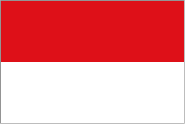Supporting Indonesia to advance their NAP process
Project Overview
Oct 2016
Indonesia ratifies the Paris Agreement
Nov 2016
Indonesia submits their First Nationally Determined Contribution (NDC) to the Paris Agreement, which states the intent to develop a NAP by 2020
2017
Indonesia requests support from the NAP-GSP, to help advance their NAP process
2017
A stocktaking exercise takes place to identify gaps and entry points for adaptation planning

Country background, Sustainable Development Goals and Paris Agreement
Indonesia is an archipelagic country home to approximately 260 million people, the 4th most populous country in the world. As population grows, so do the impacts of natural hazards, floods and droughts, which are all being intensified by climate change. Furthermore the country is dealing with sea level rise, predicted to affect 42 million people living in low-lying coastal zones. Deforestation and forest degradation is exacerbating the vulnerability of these coastal zones, making nature-based solutions, such as mangrove reforestation, appropriate adaptation strategies.
The agricultural, water and fishing industries account for the majority of livelihoods in Indonesia, as well as being those most vulnerable to climate change. Protecting these industries from the accelerating effects of climate change are crucial to Indonesia’s national plans. Although a NAP hasn’t been developed yet, the National Action Plan on Climate Change Adaptation (RAN-API) is the first comprehensive strategy focusing on adaptation. The RAN-API and the NDC Indonesia submitted to the Paris Agreement provide a sturdy framework for the NAP process to build from, and advance the integration of climate change adaptation into Indonesia’s planning and budgeting process, and maintain progress towards achieving the SDGs.
How has the NAP-GSP supported to date?
|
Conducted a stocktaking exercise
|
This exercise was undertaken to identify gaps and needs to advance the NAP process, as well as key areas for adaptation planning through the enhancement of the RAN-API. The stocktaking identified areas where the integration of climate change adaptation into national planning and budgeting processes could be accelerated. Other areas included the improvement of the vulnerability assessment process in adaptation, as well as enhancing tracking and monitoring of adaptation interventions and vulnerability areas.
|
|
Helped build capacity and facilitated access to additional climate finance |
The results of the stocktaking exercise are contributing towards the formulation of a Readiness and Preparatory Support Proposal, being developed by the government with support from UNDP, to be submitted to the Green Climate Fund, for the potential allocation of funds to support adapation planning and the NAP process.
|
News
> UNDP supporting Indonesia in drive for climate-resilient farming communities
May 2018 - Around the world, the adverse impacts of climate change are being felt keenly by smallholder farmers. The UN Development Programme is now supporting Indonesia – a country in which around 30% of the population is employed in agriculture – to help acutely vulnerable farmers in Nusa Tenggara Timur to adapt.
 Using Ocean-based Solutions for Carbon Capture in Indonesia
Using Ocean-based Solutions for Carbon Capture in Indonesia 